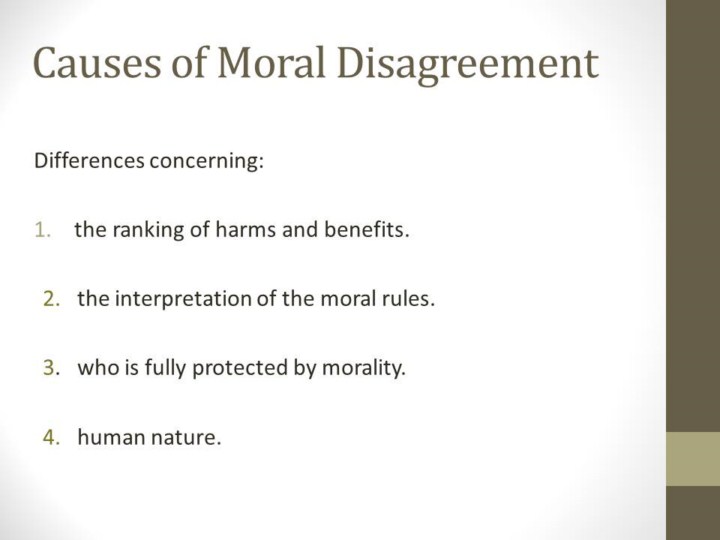| front |1 |2 |3 |4 |5 |6 |7 |8 |9 |10 |11 |review |
 |
I have already pointed out that having a common morality does not guarantee that everyone who agrees on the facts always agrees on what is the correct moral decision or judgment. Although my experience on a hospital ethics committee for a couple of decades has led me to believe that most moral disagreements involved disagreements about the facts, there are some sources of moral disagreement that can occur even when people agree on the facts. Right at the beginning I pointed out that although everyone agrees on what is a harm there is considerable disagreement in the ranking of these harms. It should be clear that when people disagree about what counts as the greater harm, they may disagree about what should be done. To take a non-controversial example: setting speeding limits e.g., 65 or 70 miles per hour. Supposed we know that a five-mile per hour increase in the speed limit will result in a slight increase in the number of accidents, and hence a slight increase in the number of injuries and deaths. But a five-mile per hour decrease in the speed limit will deprive millions of people the freedom to drive five miles an hour faster than they would have been allowed to drive. Is there a unique correct answer to how we should rank a small loss of freedom for millions against a slight increase in the number of injuries and deaths? Second: Different societies, and even different people in the same society have slightly different interpretations of the rules. Some people regard doctors as killing patients when they abide by a competent ventilator-dependent patient’s refusal to be on it any more. But in this country, most people do not regard that as killing, but only as allowing to die. Some people regard responding to a casual greeting of “How are you?” with “Fine, how are you?” to be deceiving if you are not fine, but most regard this as the appropriate social response and would regard responding with a list of one’s problem to be inappropriate and boorish. Third: The kind of moral disagreement currently causing the most controversy concerns who is fully protected by the moral rules. Everyone agrees that all moral agents, those who are required to obey the moral rules themselves, are fully protected, but there is considerable disagreement about who else is fully protected. Some people hold that fetuses are fully protected from the time of conception, other claim that they are fully protected only when they have reached the point of viability, and still others claim that as long they are within the womb they are never fully protected. In keeping with my desire to avoid taking any controversial position, I hold that all of these views are acceptable moral views and that the question of when or whether abortion should be allowed should be decided by political or legal procedures. Similar disagreements occur about animals, especially animals that are considered to be highly intelligent such as chimpanzees and dolphins. Some claim that these animals are fully protected by the moral rules, i.e., that the reasons needed to justify harming one of these animals must be as strong as those needed to justify harming a human being. Others claim, that it may be much stronger than for chickens, but it is not as strong as for human beings. Many hold that all animals are fully protected by the rule prohibiting causing pain, but not as fully protected by the rules prohibiting killing or depriving of freedom. But some people hold that it is morally required to be a vegetarian and consider zoos to be immoral. Again, I think that common morality allows for any of these views. Fourth and final: people have different views of human nature so that their estimates of the consequences of everyone knowing that they are allowed to violate a rule in circumstances with the same morally relevant features would be very different. Those who have a somewhat pessimistic view of human nature may be less inclined for everyone to know that they are allowed to violate a moral rule, and those who have a somewhat optimistic view of human nature may be more inclined for everyone to know that they are allowed to violate a moral rule. I think that those who have a pessimistic view may be moral likely to be conservative; and that those who have a optimistic view may be moral likely to be liberal. However, morality allows both views and of course, it allows for the moral acceptability of the views of both liberals and conservatives. |